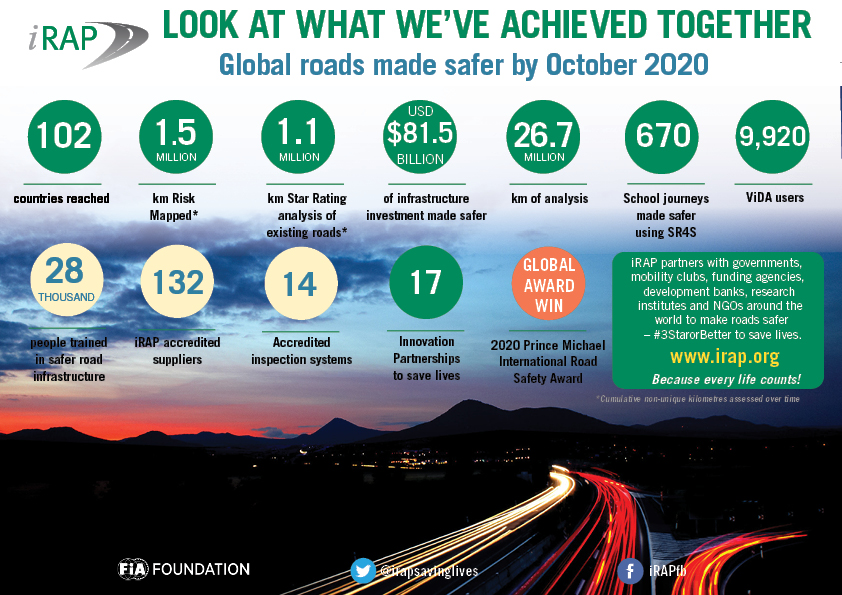iRAP’s latest global metrics highlight outstanding growth in the charity’s Training and Accreditation programme having reached almost 28,000 people in 137 countries during the past 6 years; 132 people and 14 inspection systems have been accredited since 2018 .
The figures, drawn biannually, reveal iRAP and its partners reach across 102 countries with over 1 million kilometres of assessments performed world-wide and USD$81.5 billion of road infrastructure investment made safer.
iRAP CEO Rob McInerney said we’re so proud of the work of every one of our partners in 102 countries, as recently recognised with a 2020 Prince Michael International Road Safety Award.
“Since its refresh at the end of 2018, the Training and Accreditation Programme has been a gamechanger for helping us support partners wherever they are, with whatever capacity they have, regardless of income status or experience,” Rob said.
“We are fortunate to work closely with leading donors and development organisations such as the FIA Foundation, Global Road Safety Facility who have helped us make this training possible for so many people around the world.”
“In the last year alone, 4,770 practitioners from 119 countries have undertaken iRAP training delivered in 15 languages across 75 training courses and events.
“With courses delivered for free or at minimal cost in self-paced on-line format, the programme is helping countries set and achieve star rating targets and eliminate high-risk roads,” Rob said.
Each year, iRAP reports to its major donor the FIA Foundation on the work of the charity and its partners in saving lives on safer roads across the globe. More than 15,000 partners in government, mobility clubs, development banks, NGOs and world-leading research institutions are supported by iRAP’s tools, training and programmes.
Additional highlights of this 6-month reporting period include:
- A total of over 1.1 million km of Star Rating assessments have now been completed. Countries that performed Star Ratings in the last 6 months include Australia, Bosnia and Herzegovina, Croatia, Qatar, South Africa, Spain and USA.
- A total of nearly 1.5 million km of Crash Risk Mapping has now been completed, with recent mapping in Spain, Italy, Croatia and Greece connected to the Connecting Europe Facility (CEF) SLAIN Project for the European Commission. SLAIN, and the RADAR project which spans 12 countries in the Danube region, are creating enhanced scale and partner support in Eastern and Western Europe.
- India leads in training, boasting 74 training events that reached 3,700 practitioners over time. With 61 accredited suppliers, India is a close second to Brazil with 98 accredited suppliers. For the first time people in Algeria, Bahrain, Belarus, Central African Republic, Iraq, Luxembourg, Malawi, Maldives, Norway, Oman, Suriname, Swaziland and Turkey took iRAP training – an exciting step towards safer roads in these countries.
- Star Rating for Schools (SR4S) is helping make school journeys safer in 40 countries. Thailand, Spain, Singapore, Moldova and Greece are the newest countries to apply the SR4S app. SR4S is globally available through the Lead Partner network to measure the risk children are exposed to on their school journeys and inform strategic upgrades to save lives.
- 53 countries have mobilised safer roads investment informed by RAP assessments to the tune of $48.3 billion in high income countries and $33.2 million in low- and middle-income countries.
- 13 countries have now set 3-star or better policy targets at the project level. The Malaysian Highway Authority is the latest to set an iRAP KPI for improvements on 5 highways a year.
- Nearly 48,400kms of light star ratings have been completed (mostly in Thailand) and nearly 9,000kms of Star Rating of Designs.
- ViDA has processed over 26.7 million km of data, with an additional 1,096 new users to the system in the last 6 months.
iRAP is the umbrella organisation for 10 local road assessment programmes and is supporting countries to achieve UN Targets 3 and 4 – ensuring all new roads are built to a 3-star or better standard for all road users (Target 3), and more than 75% of travel is on the equivalent of 3-star or better roads for all road users by 2030 (Target 4).
Achieving >75% of travel on 3-star or better roads for all road users by 2030 stands to save 450,000+ lives a year and 100 million lives and serious injuries over the 20-year life of road treatments, with a benefit of $8 for every $1 invested.

















